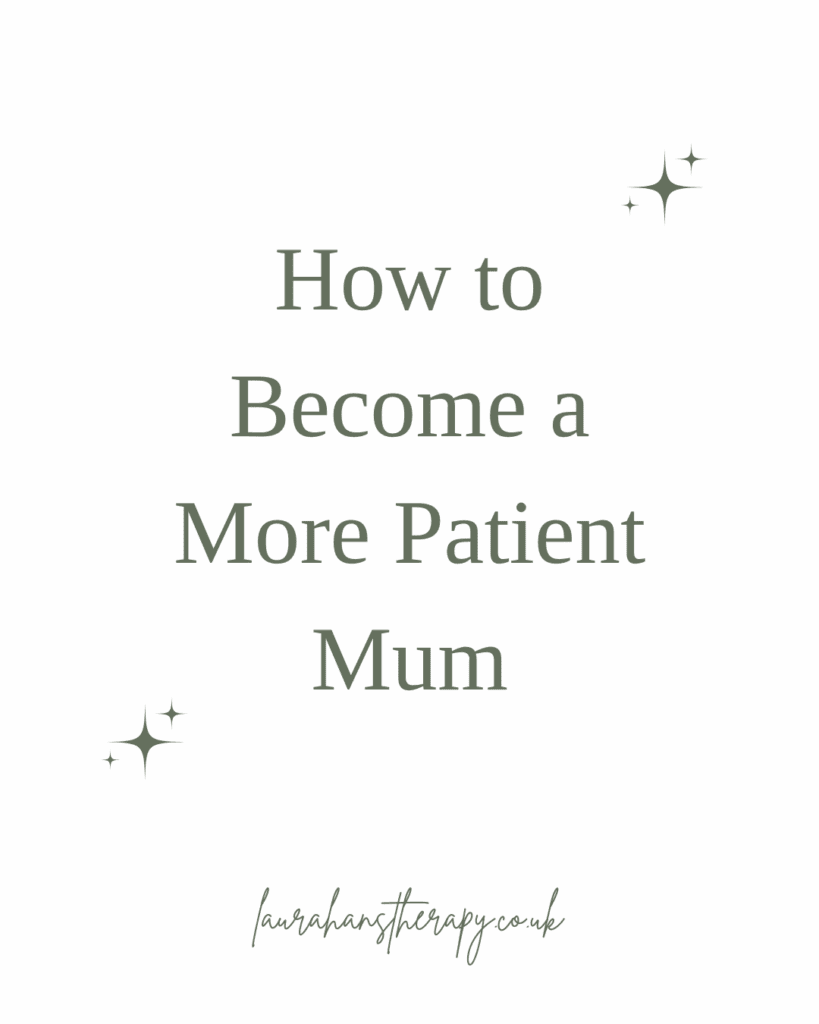Do you ever wish you could be a more patient mum? This is something I hear a lot. Parenting is a difficult, tiring job, and the ability to stay calm and settle your emotions is important, but nobody is capable of being patient 100% of the time. Yet this is often what we expect of ourselves.
Someone who struggles to meet this unrealistic expectation can easily end up feeling like a bad mum. If this sounds familiar, I’d encourage you to read What to Say to Yourself When You Feel Like a Bad Mum.
While I don’t want you to beat yourself up for losing your cool with your kids, I can also understand the desire to become a more patient mum. In this article, I’ll explain why you might be struggling and share some strategies to help.
Why Is It So Hard to be Patient with my Children?
First, it’s important to recognise how demanding motherhood can be and the impact this can have on your ability to remain calm and patient. Again, 100% patience, 100% of the time is completely unachievable and unrealistic. However, if you’re finding it hard on a regular basis, there might be an underlying cause.
People who struggle to be patient or calm as parents often have a lower capacity to deal with emotional distress due to past life experiences. Essentially, if you’ve faced more stress, trauma or adversity in your life, your ability to cope with difficulty is likely to have been compromised.
Becoming a mum and having a new baby that cries, doesn’t sleep, or isn’t feeding properly may be triggering for you. As your baby grows and develops, you’ll face other challenges like tantrums. If you have a narrower capacity to cope, you may find you become more easily frustrated or annoyed. What we’re talking about here is your ‘window of tolerance’. Read Trauma and its Impact on Your Journey into Motherhood to learn more about this.
Sometimes, children can actually trigger your past trauma or early life experiences. In this situation, a lack of patience, frustration, anger or even rage in the moment can actually be your past showing up in the present. You might find yourself experiencing big, intense emotions that go beyond what the situation warrants. Read Understanding Mum Rage for more on this subject.
How to Become a More Patient Mum
-
Go Back to Basics
Sometimes, a lack of patience is a sign we need to look after ourselves a little more. Ask yourself, am I moving my body every day? Am I eating food that nourishes me? Am I getting as much sleep and rest as I possibly can during this difficult season?
I know exercise can be tricky with a new baby, but even just a brief, brisk walk every day can improve your mental health. Alternatively, you could try doing a home workout. It doesn’t need to be long or overly complicated – five or ten minutes of exercise can make a difference. Moving your body releases endorphins and allows you to metabolise any excess adrenaline you may have accumulated.
When it comes to food, give yourself grace. Cakes, biscuits and sweet treats are a staple for new mums! However, it’s important to balance this out with foods that are going to fill you up and provide nutrients to fuel your body. This is especially true when you’re feeling depleted due to the demands placed on you.
Rest and sleep are crucial. For realistic, practical tips, read 7 Types of Rest and How to Incorporate Them into Your Life.
-
Learn to Self-Soothe
The practise of self-soothing is about using strategies to soothe and calm yourself when you become emotionally dysregulated. I have a whole series of posts dedicated to these techniques:
- The Self-Soothing Series – Diaphragmatic Breathing
- The Self-Soothing Series – Visualisation
- The Self-Soothing Series – Using Your Imagination
- The Self-Soothing Series – Journaling and Affirmations
- The Self-Soothing Series – Safety Bubble Imagery
-
Practice Self-Compassion
When mums lose their patience, they often feel guilty and berate themselves. As a result, they put pressure on themselves to be better and do better. Rather than helping, this makes them feel even more stressed and overwhelmed, increasing the likelihood that they’ll lose their patience again.
The antidote to this is self-compassion. Instead of beating yourself up, try validating your feelings. Of course things feel difficult! Of course you’ve lost your patience! There are lots of demands being placed on you and they’re eating away at your capacity to cope. This isn’t an internal failure, it’s a response to an external set of circumstances. This is why you’ve lost your patience, not because you’re inherently a bad mother.
To learn more about practicing the art of self-compassion, download my free Learning to Love Yourself guide here >>> Learning to Love Yourself
Self-compassion takes time and practice, but this resource is designed to get you started. By signing up, you’ll also become part of my community, meaning you’ll be sent regular emails packed with valuable information and tips on managing your emotional wellbeing.
-
Prioritise Repair
When you’ve been impatient with a child, it’s important to repair and let them know it’s not their fault. Explain that you’re human and that we all make mistakes and get things wrong sometimes. Reassure them, give them space to talk about their feelings, actively listen, and apologise for the impact your behaviour may have had on them.
Nurturing You Through Motherhood
If you’re doing all of the above with limited impact, and your lack of patience is affecting your mental health, it might be time to reach out for some support. Book a consultation here or subscribe to The Nurture Toolkit for free, actionable tips and prompts straight to your inbox. I also share lots of encouragement and support via Instagram.
